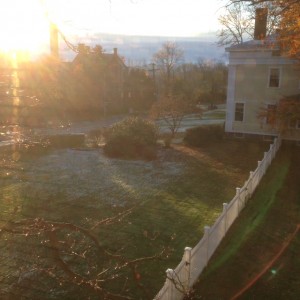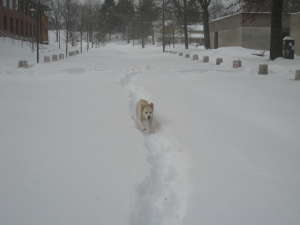During Thanksgiving week The New Republic published this short essay of mine on the “education of the whole person.” Since then, the owner of the magazine opted to create a integrated media company rather than a magazine of ideas. This is a sad event for American journalism and for thoughtful discussions in the public sphere, regardless of what one thinks of the specific positions of the magazine.
As the college admissions season moves into high gear, I’ve been talking with many stressed-out young people deciding what kinds of schools they should apply to. As president of a university dedicated to liberal education, I urge them to consider college not just as a chance to acquire particular expertise but as a remarkable opportunity to explore their individual and social lives in connection to the world in which they will live and work.
Contentious debates over the benefits—or drawbacks—of broad, integrative learning, liberal learning, are as old as America itself. Several of the founding fathers saw education as the road to independence and liberty. A broad commitment to inquiry was part of their dedication to freedom. But critics of education also have a long tradition. From Benjamin Franklin in the eighteenth-century to today’s Internet pundits, they have attacked its irrelevance and elitism—often calling for more vocational instruction.
Ben Franklin probably would have had some sympathy for the anti-college message: “You don’t need colleges. Go off and learn stuff on your own. You believe you are an innovator? You can prove it without the sheepskin. You want to start a successful company? You don’t need permission from out-of-touch professors.” From Tom Paine to Steve Jobs, stories of people with the smarts and chutzpah to educate themselves in their own ways have long resonated with Americans.
But Franklin was also dismissive of the arrogant display of parochialism. He would be appalled by the current mania for driving young people into narrower and narrower domains in the name of “day one” job preparedness. He would surely recognize that when industrial and civic leaders call for earlier and earlier specialization, they are putting us on a path that will make Americans even less capable citizens and less able to adjust to changes in the world of work.
Citizens able to see through political or bureaucratic doubletalk are also workers who can defend their rights in the face of the rich and powerful. Education protects against mindless tyranny and haughty privilege. Liberal learning in our tradition isn’t only training; it’s an invitation to think for oneself. For generations of Americans, literate and well-rounded citizens were seen as essential to a healthy republic. Broadly educated citizens aren’t just collections of skills—they are whole people. For today’s critics, often speaking the lingo of Silicon Valley sophistication, however, a broad, contextual education is merely wasted—non-monetized—schooling.
It’s no wonder that in a society characterized by radical income inequality, anxiety about getting that first job will lead many to aim for the immediate needs of the marketplace right now. The high cost of college and the ruinous debt that many take on only add to this anxiety. In this context, some assert that education should simply prepare people to be consumers, or, if they are talented enough, “innovators.” But when the needs of the market change, as they surely will, the folks with that narrow training will be out of luck. Their bosses, those responsible for defining market trends, will be just fine because they were probably never confined to an ultra-specialized way of doing things. Beware of critics of education who cloak their desire to protect privilege (and inequality) in the garb of educational reform.
“If we make money the object of man-training,” W.E.B. Dubois wrote at the beginning of the twentieth-century, “we shall develop money makers but not necessarily men.” He went on to describe how “intelligence, broad sympathy, knowledge of the world that was and is, and the relation of men to it—this is the curriculum of that Higher Education which must underlie true life.” A good pragmatist, DuBois knew that through education one developed modes of thinking that turned into patterns of action. As William James taught, the point of learning is not to arrive at truths that somehow match up with reality. The point of learning is to acquire better ways of coping with the world, better ways of acting.
Pragmatic liberal education in America aims to empower students with potent ways of dealing with the issues they will face at work and in life. That’s why it must be broad and contextual, inspiring habits of attention and critique that will be resources for students years after graduation. In order to develop this resource, teachers must address the student as a whole person—not just as a tool kit that can be improved. We do need tools, to be sure, but American college education has long invited students to learn to learn, creating habits of independent critical and creative thinking that last a lifetime.
In the nineteenth century, Emerson urged students to “resist the vulgar prosperity that retrogrades ever to barbarism.” He emphasized that a true education would help one find one’s own way by expanding one’s world, not narrowing it: notice everything but imitate nothing, he urged. The goal of this cultivated attentiveness is not to discover some ultimate Truth, but neither is it just to prepare for the worst job one is likely to ever have, one’s first job after graduation.
Instead, the goal of liberal education is, in John Dewey’s words, “to free experience from routine and caprice.” This goal will make one more effective in the world, and it will help one continue to grow as a whole person beyond the university. This project, like learning itself, should never end.







